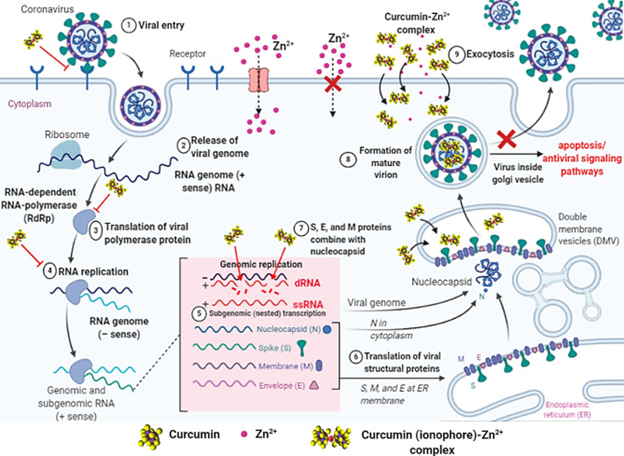Beyond dietary food patterns…plant-based compounds may mitigate COVID-19 risk
Dicken Weatherby, N.D. and Beth Ellen DiLuglio, MS, RDN, LDN
Researchers propose that herbs and plant-based compounds may have a place in the prevention and treatment of COVID-19, just as they have been used in past pandemics.
The ODX COVID-19 Series
- COVID-19: The pandemic that has become endemic
- COVID-19: Overlapping risk factors and chronic disease
- Nutritional status COVID-19: A covert factor in disease susceptibility
- COVID-19: Blood chemistry biomarker patterns - Clues and patterns lurking just under the surface
- COVID-19: Blood chemistry biomarker patterns - Down the research rabbit hole
- COVID-19: Blood Biomarkers - Neutrophils
- COVID-19: Blood Biomarkers - Albumin
- COVID-19: BloodBiomarkers - Cytokines
- COVID-19: Blood Biomarkers - Interleukin-6
- COVID-19: Blood Biomarkers - Interleukin-10
- COVID-19: Blood Biomarkers - Vitamin C
- COVID-19: Blood Biomarkers - Vitamin D
- COVID-19: Blood Biomarkers - Zinc
- Biomarker characteristics and blood type - help sharpen the COVID-19 clinical picture
- COVID-19: Initial indications and conventional interventions
- COVID-19: Long-term risk reduction - Naturopathic, functional medicine, and nutrition-based approaches to prevention
- A healthy diet is primary prevention for COVID-19
- You should have a gut feeling about COVID-19
- Beyond dietary food patterns…plant-based compounds may mitigate COVID-19 risk
- Targeted nutrition support in the battle against COVID-19
- Targeted nutrition support in COVID-19: Armed with vitamin C
- Targeted nutrition support in COVID-19: In sync with zinc
- Targeted nutrition support in COVID-19: Micronutrients and phytonutrients are important players
- Optimal Takeaways for improving immunity and reducing susceptibility to COVID-19
- Optimal - The Podcast: Episode 8 -Blood Biomarkers and Risk Factors for COVID-19 and its Comorbidities
Plants are complex “chemical factories” that have produced therapeutic compounds for human use for centuries and were the basis for widely used Pharmacopoeias. Even today, approximately 25% of modern drugs have plant origins, including the drug Tamiflu® derived from star anise (Ilicium verum from the Schisandraceae family).
Researchers propose that herbs and plant-based compounds may have a place in the prevention and treatment of COVID-19, just as they have been used in past pandemics. Research is underway on such compounds including Artemisia annua, Ephedra sinica, and Scutellaria baicalensis, all ingredients in the traditional Chinese medicine LCDD formula. The tobacco plant is of particular interest as it produces a SARS-CoV-2 protein that may be used in vaccinations. A close tobacco relative, Nicotiana benthamiana, may be a candidate for large-scale production of vaccine material.[i]
Polyphenols, phytochemical compounds found in fruits, vegetables, and even coffee may have therapeutic potential against COVID-19.[ii] Phytochemicals are unique compounds found in plants that have multi-function capabilities including antioxidant activity, regulation of nuclear transcription factors, modulation of fat metabolism, and mediation of inflammation. Examples include:[iii] [iv]
Flavonoids
- Increase insulin secretion, reduce insulin resistance
Polyphenols
- Found in fruits, vegetables, olive oil, tea, wine, curcumin/turmeric
- Correlate with significantly reduced risk of hypertension
- May prevent or modify inflammatory events associated with chronic disease
- Associated with improvement in inflammatory biomarkers related to atherosclerosis
- g., IL-6, TNF-a, soluble intercellular adhesion molecule-1, vascular adhesion molecule-1, monocyte chemotactic protein.
- Correlated with improvements in HDL cholesterol levels
- Interact with the gut microbiota
Curcumin, an anti-inflammatory compound found in turmeric, is also being researched for its potential role in calming the cytokine storm of COVID-19.[v] [vi] [vii] [viii]
Not surprisingly, there is only one place to get phytonutrients/phytochemicals and that is from plants. Incorporating plant-based foods, condiments, and supplements can help reduce risk and consequences of acute viral infections such as COVID-19.

Activity of the curcumin-Zn2+ complex in 1, 3, 4 and 8th steps at viral replication cycle of SARS-CoV-2.
Source: Celik, Cagla et al. “Can food and food supplements be deployed in the fight against the COVID 19 pandemic?.” Biochimica et biophysica acta. General subjects vol. 1865,2 (2021): 129801. doi:10.1016/j.bbagen.2020.129801 [R]
Next Up - Targeted nutrition support in the battle against COVID-19
Research
[i] Garcia, Sònia. “Pandemics and Traditional Plant-Based Remedies. A Historical-Botanical Review in the Era of COVID19.” Frontiers in plant science vol. 11 571042. 28 Aug. 2020, doi:10.3389/fpls.2020.571042
[ii] Adem, Şevki et al. “Caffeic acid derivatives (CAFDs) as inhibitors of SARS-CoV-2: CAFDs-based functional foods as a potential alternative approach to combat COVID-19.” Phytomedicine : international journal of phytotherapy and phytopharmacology, 153310. 22 Aug. 2020, doi:10.1016/j.phymed.2020.153310
[iii] Cena, Hellas, and Philip C Calder. “Defining a Healthy Diet: Evidence for The Role of Contemporary Dietary Patterns in Health and Disease.” Nutrients vol. 12,2 334. 27 Jan. 2020, doi:10.3390/nu12020334
[iv] Hoffman, Jessie B, and Bernhard Hennig. “Protective influence of healthful nutrition on mechanisms of environmental pollutant toxicity and disease risks.” Annals of the New York Academy of Sciences vol. 1398,1 (2017): 99-107. doi:10.1111/nyas.13365
[v] Soni, Vivek Kumar et al. “Curcumin, a traditional spice component, can hold the promise against COVID-19?.” European journal of pharmacology vol. 886 (2020): 173551. doi:10.1016/j.ejphar.2020.173551
[vi] Siukan, L. A. W., et al. "Commentary: A perspective of traditional Chinese medicine, curcumin, for the treatment of COVID-19." Australian Journal of Herbal and Naturopathic Medicine 32.4 (2020): 165-166.
[vii] Babaei, Fatemeh et al. “Curcumin (a constituent of turmeric): New treatment option against COVID-19.” Food science & nutrition vol. 8,10 5215-5227. 6 Sep. 2020, doi:10.1002/fsn3.1858
[viii] Zahedipour, Fatemeh et al. “Potential effects of curcumin in the treatment of COVID-19 infection.” Phytotherapy research : PTR vol. 34,11 (2020): 2911-2920. doi:10.1002/ptr.6738






